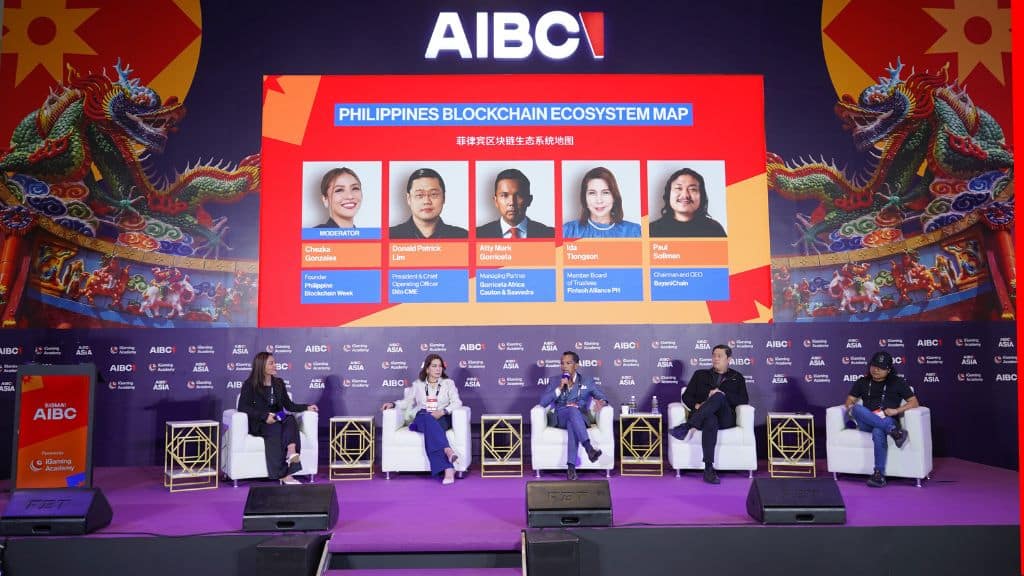- Roadshow to Rome
- Awards
- Exhibitors
- Speakers
- Media Partners
- News

At the SiGMA Asia 2025 summit in Manila, two powerhouse panels painted a compelling picture of the Philippines as a rising star in the blockchain and digital innovation space. The discussions, “Philippines Blockchain Ecosystem Map and Policy Meets Progress: Philippines’ Take on Digital Innovation, Inclusion, and Investment,” underscored a critical shift: the country is not just catching up, it’s laying the groundwork to lead.
In a country comprising over 7,000 islands, connectivity is more than a technical issue; it’s a national imperative. Atty. Jocelle Batapa-Sigue, formerly with the Department of Information and Communications Technology and now part of the International Telecommunication Union’s Digital Innovation Board, emphasised the importance of digital infrastructure:
“Where infrastructure goes, the jobs are also going… 70 to 80% of our talent is in the countryside waiting for digital infrastructure to open up more and more jobs for them.”
With a youthful, digitally savvy population, median age 25, the Philippines is strategically positioned to reap the benefits of a demographic dividend. As Batapa-Sigue noted, “Creativity is never a soft skill. It’s really a very important skill,” highlighting the value of Filipino talent in industries like gaming and tech startups.
One of the most significant developments was the recent release of the Crypto Asset Service Provider (CASP) regulation by the Philippines’ Securities and Exchange Commission, as Atty. Mark Gorriceta, Managing Partner of Gorriceta Africa Cauton & Saavedra, explained:
“Just past 48 hours, our Securities and Exchange Commission… issued rules pertaining to crypto asset service providers. That means ICOs, order books, crypto staking, these might now be possible.”
Paul Soliman, CEO of BayaniChain, emphasised how this regulatory clarity puts the Philippines ahead of regional competitors:
“In Singapore, there’s no CASP-like regulation right now… the Philippines is in the middle, open and yet cautious.”
This balance was echoed by Ida Tiongson, Fintech Alliance PH trustee, who described the country as “careful but not restrictive,” particularly in relation to blockchain’s growing importance in sectors such as banking and education.

Olga Yaroshevsky, Managing Director, AIBC, Atty. Jocelle Batapa-Sigue, Member, Digital Innovation Board, International Telecommunication Union (ITU)-BDT and Jason Mendoza, Chief AI Officer, National Development Company
Government support is extending beyond compliance. Real-world blockchain deployments are underway. The Department of Budget and Management, for instance, is tokenising national budgets:
“You can see all the budget issuance… that is minted on Polygon and our local chain,” said Soliman.
The local-first approach also supports data sovereignty, as emphasised by Soliman:
“If I’m a Filipino, I want my data in my own country… It’s very important.”
Moreover, blockchain’s potential in remittances, digital identity, and transparency was repeatedly cited as transformational.
“Imagine how much an OFW can send to the Philippines just with respect to the use of blockchain,” said Gorriceta. “That will solve financial inclusion.”
The National Development Company (NDC), through its Philippine Innovation Hub, aims to incubate at least 100 startups in its first year, according to Chief AI Officer Jason Mendoza. With generous tax incentives and cross-industry collaboration, the hub is targeting AI, blockchain, cleantech, and other emerging technologies.
“We envision this hub to launch at least a hundred startups… and we’re aiming for a thousand,” Mendoza stated confidently.
The synergy between public policy and private innovation is at the heart of this transformation. As Batapa-Sigue put it:
“We need to develop more and more policies that actually strengthen and support international collaboration.”
The future of blockchain and digital innovation in the Philippines is not a question of potential; it’s a matter of acceleration. The talent, regulation, infrastructure, and ambition are all aligning.
To witness this evolution in real time and be part of the conversation shaping the future, follow the SiGMA Asia 2025 agenda and don’t miss the panels, pitches, and opportunities that could define the next digital frontier.